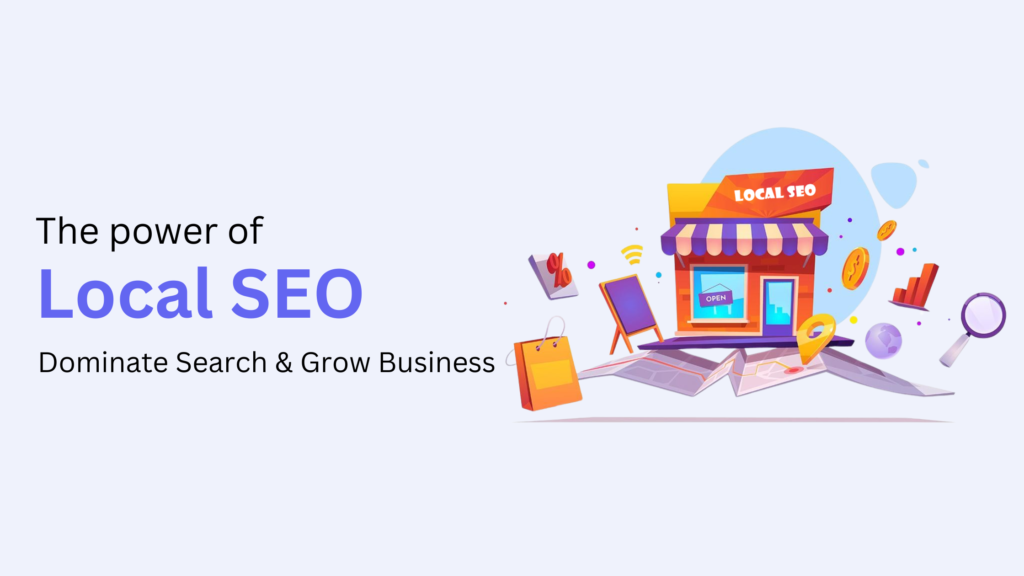Table of Contents
In today’s digital-first world, local SEO (Search Engine Optimization) has become a critical tool for businesses aiming to attract customers within their geographic area. With over 90% of consumers using search engines to find local businesses, mastering local SEO can give your business the competitive edge it needs to dominate local search results.
In this blog, we’ll dive into the importance of local SEO, strategies for optimizing your online presence, and actionable tips for improving your local rankings. Whether you’re running a small restaurant, a retail store, or a service-based business, local SEO can significantly impact your bottom line.
What Is Local SEO and Why Does It Matter?
Local SEO refers to the process of optimizing your online presence to attract more business from relevant local searches. These searches are conducted on search engines like Google, Bing, and even platforms like Yelp.
For instance, when someone searches for “best coffee shop near me” or “plumber in [city],” the businesses optimized for those queries appear in the search results. Local SEO helps ensure that your business is visible to these searchers, increasing the likelihood of them choosing your services.
Why Local SEO Matters:
Increased Online Visibility: Ranking higher in local searches means more potential customers will discover your business.
More Foot Traffic: For brick-and-mortar businesses, local SEO translates to more physical visits.
Higher Conversion Rates: Local searches often result in immediate action, such as a phone call, visit, or purchase.
Enhanced Trust and Credibility: A strong local SEO presence signals legitimacy and trustworthiness to potential customers.
Key Components of Local SEO
1. Google My Business (GMB) Optimization
Google My Business is the cornerstone of any local SEO strategy. A fully optimized GMB profile can significantly improve your local search rankings and attract more customers.
Steps to Optimize GMB:
- Claim and verify your GMB listing.
- Add accurate business information, including your name, address, phone number (NAP), and website.
- Select appropriate business categories and services.
- Upload high-quality photos of your business, products, or services.
- Encourage satisfied customers to leave reviews and respond promptly to feedback.
2. Local Keyword Research
Understanding what your customers are searching for is essential. Local keyword research helps you identify the phrases and terms potential customers use to find businesses like yours.
How to Perform Local Keyword Research:
- Use tools like Google Keyword Planner or Ahrefs to identify popular local search terms.
- Focus on “near me” and location-specific keywords, such as “dentist in London” or “best Italian restaurant in Manchester.”
- Integrate these keywords naturally into your website content, metadata, and blog posts.
3. On-Page SEO for Local Rankings
On-page SEO involves optimizing your website to improve its visibility for local searches.
Best Practices:
- Include your target city or region in title tags, meta descriptions, and headers.
- Add a location-specific landing page for each area you serve.
- Use schema markup to provide search engines with additional details about your business.
4. Online Directories and Citations
Consistency across online directories is crucial for local SEO success. Your NAP should be identical across all platforms.
Popular Directories to Focus On:
- Yelp
- Bing Places
- Apple Maps
- Local chamber of commerce websites
5. Customer Reviews
Reviews are a powerful ranking factor for local SEO. Positive reviews not only improve your rankings but also influence potential customers’ decisions.
How to Get More Reviews:
- Politely ask customers for reviews after providing excellent service.
- Offer incentives, such as discounts, for leaving a review (if allowed by the platform).
- Respond to both positive and negative reviews to show engagement.
6. Mobile Optimization
Most local searches are conducted on mobile devices. Ensure your website is mobile-friendly, with fast loading times and an intuitive design.
Tips to Improve Local SEO Rankings
- Leverage Local Content: Write blogs and create content that resonates with your local audience. For example, “Top 5 Hiking Trails in [Your City].”
- Build Local Backlinks: Partner with local bloggers, news outlets, or organizations to earn high-quality backlinks.
- Utilize Social Media: Regularly update your business’s social media profiles and engage with your audience.
- Monitor Your Competitors: Analyze what your competitors are doing well in their local SEO strategies and adapt accordingly.
The Role of Analytics in Local SEO
Tracking your progress is essential to refining your local SEO strategy. Tools like Google Analytics, Google Search Console, and local SEO platforms like BrightLocal can provide insights into:
- Traffic sources
- Keyword performance
- User behavior on your website
- Conversion rates from local searches
By analyzing these metrics, you can identify areas for improvement and adjust your strategy accordingly.
How SEO Booster UK Can Help with Local SEO
At SEO Booster UK, we specialize in creating tailored local SEO strategies that deliver measurable results. Our Local SEO Starter Plan (€49.99) includes Google My Business optimization, local keyword research, and competitor analysis to help you rise to the top of local search rankings.
With our expertise, you can attract more local customers, drive foot traffic, and grow your business sustainably. Let us handle the complexities of local SEO while you focus on delivering exceptional products or services.
Conclusion
Local SEO is no longer optional—it’s a necessity for any business wanting to succeed in today’s competitive landscape. By optimizing your online presence for local searches, you can increase your visibility, attract more customers, and ultimately boost your revenue.
Start dominating your local search results today with SEO Booster UK’s Local SEO services. Contact us for a consultation and discover how we can help your business thrive!
